Base
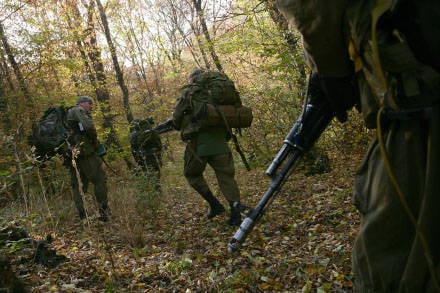 It was the fifth year of the counter-terrorist operation in the North Caucasus, the situation was normal. The united grouping was, as always, feverish. The militants had everything according to the plan, as usual, not coordinated with anyone, let alone with our superiors.
It was the fifth year of the counter-terrorist operation in the North Caucasus, the situation was normal. The united grouping was, as always, feverish. The militants had everything according to the plan, as usual, not coordinated with anyone, let alone with our superiors.The result is needed by all
In the fourth year of the hostilities, in addition to the United, a grouping of troops in the mountainous part of the Chechen Republic (in common - mountainous) was created, and for that, only the higher headquarters know. Well-established management began to split, confused, it became cumbersome. Both groups demanded a result from the special forces.
If the result was more or less normal, then there is honor and praise to the command, which is the first to report on the tremendous success in the field of the fight against banditry.
The result demanded everything.
Statistics is a good thing
We began to analyze what, how and where we do wrong. Dug in old reports. I was interested in statistics, where and when, at what time was it possible to “debit” one of the militants? How much? The nature of the area? How did you go? What were your condition? What did our units do before the fire contact? Was it a prearranged and planned ambush, or did the collision occur during a march transition? Were there any firing contacts during the raids on the found bases and days?
Statistics is a good thing, and if we approach the analysis and study of all combat clashes involving special-purpose units and divisions with a particular system, then very good results can be obtained.
I, digging into computers and reports, to create some kind of system, sketched a tablet with graphs: time, place, circumstances, and slowly filled it, hoping to isolate at least something useful for myself.
In the end, he came to a disappointing conclusion: a meeting with militants is seventy percent a matter of chance.
If ambush events were carried out, if there were results, it was mainly in areas where there were any suitable roads or paths for movement.
In the course of search actions, firing contacts took place, mainly during a sudden meeting with militants. Usually, after an armed clash, with a further favorable outcome, the terrain was searched for us. He noted for himself several cases when, when inspecting somewhere, a militant base was found nearby.
From my own experience
I remembered my own experience of 2002, when, as deputy commander of a detachment, I was on a combat mission as an operational officer with a reconnaissance detachment from our battalion. Then the reconnaissance squad, operating in the silk woods, stumbled upon a superior group of militants.
When I heard from the signalman about the fighting going on, I left the command post, which was organized in a separate special purpose battalion in the village of Shelkovskaya, and on one armored personnel carrier with four attached sappers and two machine-gunners, flying over to the village of Paraboch, drove into the forest, everywhere shots rang out and machine gun bursts. Dismounting, we got for armor to our intelligence officers, who sat down behind a road moat. They managed to escape from the encirclement, having broken through the positions of the militants, thanks to competently organized machine-gun fire at the breakthrough site.
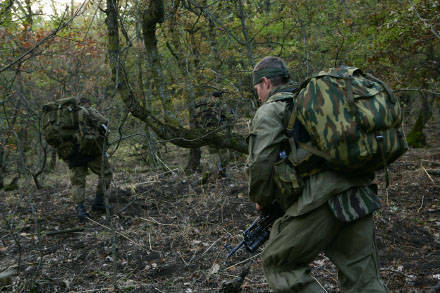 Shooting, we left the forest, losing only three people: the commander of the group who died in the landing of an armored troop-carrier, the foreman-contract soldier, the deputy commander of the group, and an ordinary radio operator. Although in that situation, without cover and artillery support, they could lose more than half of the group ...
Shooting, we left the forest, losing only three people: the commander of the group who died in the landing of an armored troop-carrier, the foreman-contract soldier, the deputy commander of the group, and an ordinary radio operator. Although in that situation, without cover and artillery support, they could lose more than half of the group ...Need a base
Then a large-scale special operation was organized, other special forces units were involved, they also had losses. The next day, my reconnaissance squadron, inspecting the scene of the clash, discovered the capital base of the militants.
So, to get the result you need a good base. Usually, when detecting ditches, caches, hiding places and temporary shelters, the found property was seized, eaten, put on itself as much as possible, and all unsuitable for wearing, eating and economic needs was destroyed by the method of detonation with compulsory photographing.
And what did it give us? Nothing but the next number in the report column: “it was discovered that bases, ammunition, food were destroyed,” well, plus, of course, moral and some material satisfaction. They tried, of course, to sit for a day — two at the base, to arrange an ambush. But, as usual, the timing of the combat order is pressed, the batteries sit down, and somehow the militants calculate that "the base is not the same and there is nothing to go there."
A seditious thought crept into my head: to try to realize the idea, which I wanted to carry out another year in 96? M, but somehow did not grow together due to the August battles in Grozny, and then followed by reconciliation and withdrawal of troops.
Design and Selection
I shared the plans with the detachment commander and deputy. The commander, when traveling to the headquarters of the group, cautiously expressed the idea to the head of intelligence. He was cautious, but gave the go-ahead, arranging the whole thing in such a way that if something happens, he will remain in the wrong place, declaring everything a personal initiative of the squad leader ...
The idea was simple: when detecting a militant base, do not destroy it, do not mine, and generally do nothing with it, but settle down and work with it yourself, conducting intelligence on yourself and making forays around the neighborhood as part of subgroups, having a reserve. If everything is thought out and coordinated with supporting and interacting units, then the presence of the intelligence officers at the base will be as secure as possible.
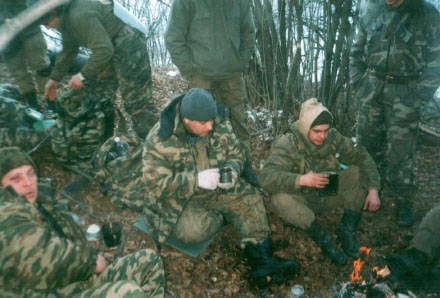 In order to find suitable bases in the detachment’s area of responsibility, after a few days, several groups of people on foot advanced with the task of not touching anything upon detection, to conduct the most careful search, to remove coordinates. If nothing suitable could be found, one of the groups was to proceed to equipping the space for the base, digging holes for dugouts, and building hidden observation points. The base could not be found, but they found a good place in the decay between two high-rises, near the stream. Nearby there was a good platform on which, if necessary, it was possible to land a helicopter for a sudden evacuation or disembarkation of additional groups. From the base equipment site, communication with the combat command center of the detachment was excellent, although on the specialized maps brought from the group headquarters, these places were designated as “radio-visible zones”. In three kilometers to the north, there was a good dirt road, on which both armored vehicles and passenger cars and cargo civilian vehicles could easily pass. Nearby skyscrapers were quite suitable for observation posts, from which a small village and neighboring heights were perfectly visible through optics. In the end, after long gossip and decisions with the place of the organization base.
In order to find suitable bases in the detachment’s area of responsibility, after a few days, several groups of people on foot advanced with the task of not touching anything upon detection, to conduct the most careful search, to remove coordinates. If nothing suitable could be found, one of the groups was to proceed to equipping the space for the base, digging holes for dugouts, and building hidden observation points. The base could not be found, but they found a good place in the decay between two high-rises, near the stream. Nearby there was a good platform on which, if necessary, it was possible to land a helicopter for a sudden evacuation or disembarkation of additional groups. From the base equipment site, communication with the combat command center of the detachment was excellent, although on the specialized maps brought from the group headquarters, these places were designated as “radio-visible zones”. In three kilometers to the north, there was a good dirt road, on which both armored vehicles and passenger cars and cargo civilian vehicles could easily pass. Nearby skyscrapers were quite suitable for observation posts, from which a small village and neighboring heights were perfectly visible through optics. In the end, after long gossip and decisions with the place of the organization base.Increased secrecy
The group, preparing to sit down for a month in the “forests”, was decided to isolate as much as possible from the outside world. All the personnel, headed by the deputy group commander, flew to Khankala in one of our units and prepared to perform the task at another point of temporary deployment, going out every day to conduct shooting and engineering training. All the fighters were forbidden to shave; they were allowed to cut their hair only baldly, and they were overjoyed and began to grow scanty beards and mustaches.
There was another plus in the fact that the group was removed from the squad. Near the nearby military commandant's office of the region was a retail outlet where Chechens were constantly spinning. I don’t know whether there was a leak or not, but the fact that the movements of our columns and the exit of the groups were constantly under control was clear and true even without warnings from the employees of the “watchful bodies”. Especially not far from our LDPE literally three kilometers along the road was a very disloyal village. Rural shepherds, grazing their sheep and cows, often witnessed the passage of our reconnaissance groups, often forgetting about the secrecy of movement. Literally a kilometer from the village on the bald mountain top, helicopter pilots chose a good landing site and often landed on them scouts, spit on the commanders' requests and motivating their actions with all kinds of excuses. Application for Aviation we filed in advance, deciding to withdraw the group directly from Khankala, for the landing of helicopters on our squadron and the reception of scouts on board would not go unnoticed. During the landing, the groups decided to agree with the crew on a pair of false landings and on distracting maneuvers. After landing a group in an area a few kilometers from the base, the helicopter had to circle, then go to the site near the village, the group that equipped the base and left bookmarks, took the helicopter onto itself, marking the place of reconnaissance evacuation with smoke. If someone will observe from the side, then he will see, only that the helicopter took commandos on board and went towards the location of the commandant’s and detachment. The group, accordingly, will land on our equipped site, and the helicopter will leave for itself at the airfield.
Departed scouts on foot marches will have to reach the base, retrofit it and not show their nose at all for a week, conducting only mandatory two-way communication sessions. Food and ammunition decided to deliver to the equipped caches groups passing through the area to perform other reconnaissance tasks, and throw them from helicopters in a predetermined location, as far as possible from the base.
It was necessary to solve a few pressing problems. One of them is batteries for radio stations and their charging. In addition to the batteries, the station needed to charge the batteries for night-time binoculars, night optics, a camera and others.
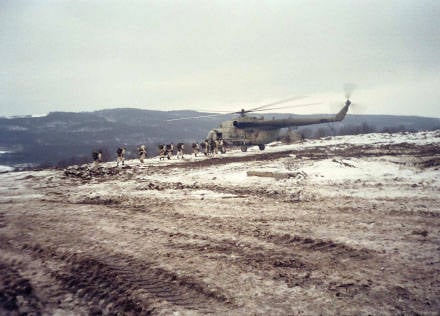 Portable chargers, working from a manual drive, in the detachment were available, but they did not solve the problem. The market in the district center purchased, naturally at its own expense, a small, weighing only five kilograms, petrol unit made in Japan, working almost silently, consuming little gasoline and allowing not only to charge the batteries, but also to use for other household needs. The unit after the purchase was immediately tested by the battery operators and issued a positive conclusion about suitability to work.
Portable chargers, working from a manual drive, in the detachment were available, but they did not solve the problem. The market in the district center purchased, naturally at its own expense, a small, weighing only five kilograms, petrol unit made in Japan, working almost silently, consuming little gasoline and allowing not only to charge the batteries, but also to use for other household needs. The unit after the purchase was immediately tested by the battery operators and issued a positive conclusion about suitability to work.During the month, work was carried out on the engineering equipment of the base, delivered ammunition, mines, food, medicine and other supplies, and all tried to do the most secretly.
The group commanders grumbled, were indignant, but things were gradually moving.
Design and organization of interaction
The commander of the "guerrilla" group remained in the detachment, participating in further planning and coordination. Despite all his indignation, I fed him every day with intelligence reports, reports about interceptions of "enemy correspondents", aerial photographs of the area and other very tasteless products.
There were no problems with military orders, because I usually did it myself, sent a file to the group headquarters via a military electronic documented connection, calling it the intention of the detachment commander. In our department, he was “substantially ruled”, that is, they did nothing with him, they only signed the relevant heads, well, in some places a couple of commas (I always have problems with that) and sent him back, calling him a military order. Applications for artillery and aircraft were submitted in the same way.
An unexpected opposition to the realization of the idea was rendered by detachment logistics men. How all received property will be written off, on whom it will hang, how will the accounting be kept? They didn’t bother long, the squad commander asked the bashing, and they calmed down for a while.
Now it was necessary to solve one of the most important tasks - to organize fire support for intelligence officers operating in isolation from the main forces for a long time. Since the battery of the self-propelled artillery regiment was literally ten meters from the location of the detachment, coordination was conducted at the level of personal contact. The gunners planned and shot targets, and the groups in the area adjusted the fire. The necessary amendments were made, and the base area on the map was filled with triangles with numbers. In the event of an unforeseen situation, at the request of the commander of the group, the gunners could provide a fire barrier around the perimeter of the base area, and organize a corridor to rush to leave the area.
Most of the time, it took coordination with other security agencies, which also sometimes worked in our area of responsibility. It happened that our scouts face-to-face faced the scouts of the internal troops who decided to organize a search and did not coordinate it with anyone. Mountain group was in Vedeno, and United - in Khankala. Both there and there the chiefs. There was no clash only by luck, although a couple of times lazily fired at each other from a distance. It was necessary to hang on the phones and travel, and even conduct diplomatic conversations, so that neither a word nor a look to give out their intentions.
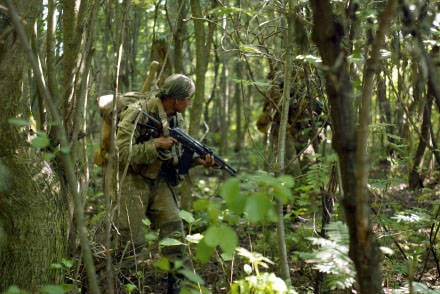 The most problematic structure is, of course, the local militia, consisting mainly of the “former”. This generally does not give a damn. Climb to where they are not asked, and do what they want. They can bombard ours, and with dignity retire. They can, on their own bloodlines, "otduplitsya", recalling the cow stolen during the time of Gorbachev. They will shoot, prikadyut cold corpse, and then another in the prosecutor's office knock on the alleged "rioting feds." It remains to hope that they will not climb so far into the mountain-woodland.
The most problematic structure is, of course, the local militia, consisting mainly of the “former”. This generally does not give a damn. Climb to where they are not asked, and do what they want. They can bombard ours, and with dignity retire. They can, on their own bloodlines, "otduplitsya", recalling the cow stolen during the time of Gorbachev. They will shoot, prikadyut cold corpse, and then another in the prosecutor's office knock on the alleged "rioting feds." It remains to hope that they will not climb so far into the mountain-woodland.The most understanding were the security officers from the anti-terror departments. All agreed within a few minutes. They understood me, I understood them, drank tea with vodka and parted, quite pleased with each other. Three days before the landing, the group commander was sent to Khankala to his subordinates. Preparation for the event took about a month. It seems everything is agreed in all instances. All papers are studied and signed. The base is waiting for its "partisans".
Basing
Mi-8 circled for a long time, then sat down on the platform, marked with smoke, and took the group. "Partizan" has long been aboard. By evening, received a report on the means of communication that everything is in place. WG SPN lay down on the basis of the "preservation".
Now they will sit for a week and not stick out, equip your life and observe, slowly studying the terrain.
Other intelligence agencies assigned by the detachment worked according to plan and even yielded little results. Found a couple of caches of food. On the forest road fired a passenger car with militants. The fire contact lasted about three minutes from strength, then the driver and two passengers jumped out and, firing, disappeared into the forest. The militants are gone, but the old white “six” remained standing still.
They inspected the car, found in the trunk several homemade loaders and several kilograms of TNT. At first they wanted to drag the Zhiguli into the detachment, but the commander of the battalion, fearing the beating of the supervisory authorities, ordered the car to be blown up on the spot.
No enemy is worse than their own stupid boss.
Problems arose from nothing. Exactly a week later, one of the high chiefs flew in and began to check the organization and conduct of combat and intelligence activities. Upon learning that we had organized a base in the detachment’s area of responsibility, he shouted and began to blame all small and large squad leaders for fraud. According to him, it turned out that the base was organized specifically in order to give it out for the militants found base and hide the corpses of “innocently killed civilians” on it, as well as the loot and pilfer. Began to rustle paper. Checked combat orders, orders, statements, decisions. And here, at the very apogee of indignation, the operational duty officer squeezed uncomfortably sideways to the place of the battalion through the canvas curtains and asked the chief for permission to turn to the detachment commander. The boss nodded imposingly, but immediately jumped as if stung upon hearing the patter of the duty officer’s report. One of the partisan subgroups fought a group of militants five hundred meters from the base.
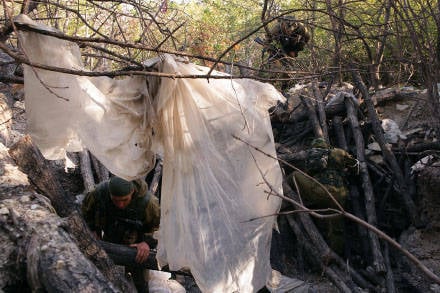 The presence of the big boss brought nervousness and, frankly, greatly interfered with the work of the shift shift, the operational duty officer and operational officer.
The presence of the big boss brought nervousness and, frankly, greatly interfered with the work of the shift shift, the operational duty officer and operational officer.However, it was not for nothing that they prepared for almost a month. When the commander of the group requested the artillery cut-off "to the right of two hundred such targets," the big commander expressed doubt that the gunners could orient themselves around the terrain and organize the correct covering of the target, and would they have time to make any corrections and even shoot. But he did not even finish speaking when the first salvo slammed. The group commander began working directly with the battery, adjusting the fire. The covering of the departing militant group occurred from the second salvo. The chief began to rush everyone with reports on the outcome of the battle. At such times I, for example, generally try not to interfere in the actions of the group commander and not to go to him with commands and advice, because I do not know the full extent of the situation, I do not see with my own eyes the terrain and order of battle of my unit, and In the end, I do not see the enemy. Therefore, it is better not to interfere with the commander.
Due to the presence of the higher leadership, the situation became more and more nervous, and I, out of harm's way, went out with the CBU and went to the communications center to listen to the reports of the group commander directly from the center radio station. Twenty minutes later the battle was over, the militants still managed to withdraw. The persecution was organized, but it brought no result. But while inspecting a battle site, two fresh and fully equipped corpses with weapons and with huge backpacks.
“Submit here Lyapkina-Tyapkina!”
The boss, hearing this, sighed with relief and calmed down, and then again developed vigorous activity. The bodies were photographed from different angles, they found some documents with them, they began to transfer data, weapon numbers, a description of the contents of the backpacks. But the authorities of this was not enough. He began to call Khankala and request a helicopter search group from a local squad to transport corpses and trophies. This meant one thing: if the helicopter sits down on the platform near the base, then there is a real threat of its illumination. Thank God, the KP aviation was flying off at the end of the day, and the helicopter was promised only in the morning, after the weather intelligence. Time until the next morning was enough. Half of the "guerrilla" group moved to the second, distant landing site, pulling the "result" on itself.
By five in the morning they barely crawled. On the bald top of the hill, corpses and other trophies were camouflaged on the edge of the bushes, they laid out an identification mark from the stones so that they could be seen from the helicopter. The deputy commander of the group took the coordinates of the site using a satellite topohvvyazchik and, having rechecked them once more, handed over to the TsBU detachment. A detailed description of the cache was transferred to the detachment headquarters in Khankala. It remained only to disguise and wait for the helicopter with the search group. We decided not to shine the subgroup at all, hoping that the search group commander will accurately come to the burial site and keep in constant contact with the subgroup that was dragging the “result”.
A helicopter with VPShG (air search assault group) and a covering pair of "twenty-fours" rustled their blades over the squad at exactly half past nine. The crew of the "green" (Mi-8) exchanged a few words with our aircraft designer and went on. The commander of the VPSHG from the Khankala detachment was quite experienced and had already worked in the air. Therefore, when entering the area, he immediately contacted a subgroup on the ground and was constantly in touch. We entered the site and landed quickly, thanks to a stone sign, clearly visible from the air. The subgroup, lying in the bushes, trying not to betray themselves, lay and did not gleam. Therefore, the NSP (ground signal cartridge) to determine the strength and direction of the wind on the ground had to be thrown from a helicopter.
The scouts landed, occupied the perimeter defense around the helicopter, which was molded with blades, and began to search the bushes. Everything! The dead bodies were found, fast loading, and the helicopter is in the air again. Our subgroup never lit up, watching the actions of the HSV from afar. As it turned out, measures to ensure secrecy were not taken in vain. When flying around the area, before lying on the course, several shepherds were found on the helicopter board, grazing a few flocks of sheep. Most likely, they carefully watched the landing of the group and, perhaps, even "told who should."
The chief, personally inspecting the corpses, admired and ordered the detachment commander to prikapat them somewhere nearby, and hand over their weapons to the RAV warehouses in the grouping.
The game was worth the candle
The idea with the base was justified. True, then I had to almost every day send out various photographs, schemes and designs, but this is a usual thing. The base continued to function.
Literally, as soon as the wheels of the helicopter chassis broke away from our site, taking the authorities and the helicopter search group to Khankala, the “partisans” again contacted. One of the observation points found a couple of civilian vehicles at a nearby height. Obviously not lumberjacks - they drive tractors, not the Nivas, and the ramson collectors mostly use their feet. The post continued to observe, and the group commander at that time was constantly in touch. Fifteen minutes later a group of armed men climbed to the edge of the forest at the top. Most likely, the remnants of the gang, who quit after yesterday evening's fight. Nearby in the area led another search group of the detachment. We decided to retarget it on a tip from the "partisans". However, no matter how hard the attendant fought, the group could not be called up by means of communication, and the obligatory two-way session should take place only in the evening ...
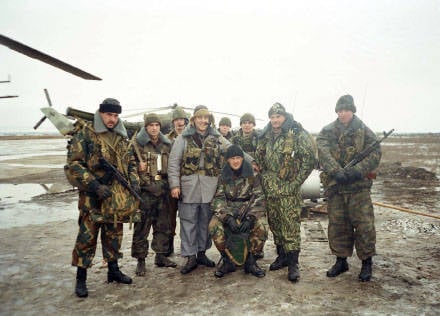 The battery crashed again. The hit happened only after the third shot, so one of the cars managed to hide in the woods, but a group of fleeing people and the second car covered with an explosion.
The battery crashed again. The hit happened only after the third shot, so one of the cars managed to hide in the woods, but a group of fleeing people and the second car covered with an explosion."Guerrillas" continued to observe, but no one else appeared. On the hill, the Niva, turned upside down, lonely stuck. In the evening, another group, which still contacted, inspected the places of breaks. Found a large number of fragments of bodies, inspected the broken car. After that, they made an ambush for the night. In the morning, all carefully photographed. The boss, who was with us checking, ran around the headquarters of the group and exulted.
Application of technical means
A few days it was quiet. "Guerrillas" conducted reconnaissance around the base, without departing far away, set up observation posts. We found several more good paths, on one of which we installed a set of reconnaissance and signaling equipment, combining it with a minefield controlled by a radio detonation of charges.
The hardware worked as it should. The results were quite edible. In contrast to the tasteless and dirty fighters, mines cut a whole brood of boars, which had to be eaten.
One night, the observation post detected light signals that were coming from a height located near the village. One of the contractors, who were on the NP, was carrying a mobile phone with a camera. Without thinking twice, he took all the light signals on video and after the shift showed the filmed video to the group commander, which he immediately reported to the CBU. The direction of the signals was spotted accurately and in the morning they organized a search. The place of the cache was discovered by chance. The fighter, who saw the cellophane sticking out of the ground, set out to take him to the mat. But when he dragged it towards himself, a layer of turf and branches fell down, under which a very nice hole was found, with a large can, embedded in it, about 100 liters. The can, unfortunately, was already empty. The terrain was searched more carefully, and we managed to find traces. The commander requested permission from the CBU to conduct a night ambush. I asked him to remove the coordinates on the GPS and for the time being to leave the place where the cache was being laid, without leaving my tracks.
I decided to request, via Khankala and Vedeno, radio survey results of radio interception from the area. As I was told, there were no interceptions in this area for a long time, and there are no active manifestations of militant correspondents at the moment. Maybe it is so, or maybe it’s just that there are not enough means for conducting radio intelligence and locating enemy radio stations in the area, and it’s not necessary to inform me about it.
Here it is necessary technically ...
It is a pity, but in the squad there are no radio survey groups equipped with small-sized technical means. Of course, we have small portable receivers, but with their help we can only determine the approximate direction to the source of the signal, and even that is not always the case.
And so they would put the operator-antenna system, or even better the operator-interpreter, spread all antenna-feeder systems there, disguise, and get our subgroups searching in the region with fresh, extremely necessary information and target designation. We have a bad situation with the necessary technical means in the work.
Or, for example, let's say, you need to transfer graphic information to the CBU: photos of the object or the murdered mojahed. And what would you do? Photograph, and then photographs in electronic form on foot to deliver to the squad? Our new correspondent radio stations have the function of transmitting digital information, which is interfaced with a PC and can operate as a radio modem. It seems to be good, and the software is. But at the same time we do not have computers adapted and certified for this business.
There is no one to pull the string
We talked on the radio with the commander of the "partisans" and, after a little reflection, we came to the decision to watch the cache and try to track the movement of illegal formations in the area. A few days later the flashlight signal again in the same sequence and with the same frequency. And the subgroup is already nearby ...
This time, the cache was filled with food, which they immediately immediately seized and continued to observe. By morning, three bearded men with machine guns and roomy backpacks pulled themselves up to the hiding place. The ambush turned out to be classic - they poured out of two silent automatic machines, point-blank. Militants did not even have time to understand anything. The corpses had to be dragged with curses almost to the base itself, because somehow I did not want to click the camera with a flash.
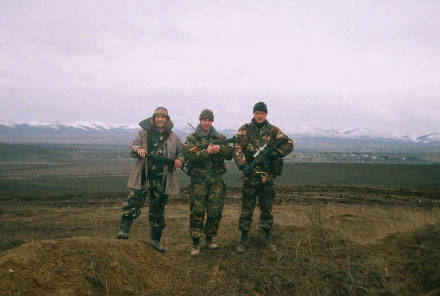 Prikopali them under the spreading beeches, topping to the thread. A cache was used for two more weeks, while at the base. The unknown well-wisher bookmarked exactly once a week and left. "Guerrillas", reluctantly and spitting on remorse, used gratuitous help, intended not to them. Taking an accomplice did not make sense yet. Well, they would have taken him "lukewarm", and in the morning the whole nearby village would have gone in search of him, sowing panic around him. As a result, a local hunter would definitely come across a carefully guarded base. To work with such a contingent, we need specialists who could, during the “conversation” with the prisoner, pull and pull out all the string that would lead them to much more serious people. Well, our intelligence officers of such cases are poorly trained.
Prikopali them under the spreading beeches, topping to the thread. A cache was used for two more weeks, while at the base. The unknown well-wisher bookmarked exactly once a week and left. "Guerrillas", reluctantly and spitting on remorse, used gratuitous help, intended not to them. Taking an accomplice did not make sense yet. Well, they would have taken him "lukewarm", and in the morning the whole nearby village would have gone in search of him, sowing panic around him. As a result, a local hunter would definitely come across a carefully guarded base. To work with such a contingent, we need specialists who could, during the “conversation” with the prisoner, pull and pull out all the string that would lead them to much more serious people. Well, our intelligence officers of such cases are poorly trained.Finale
For a month of work, the "partisans" from the base brought a very significant result. At the inhabited place, another group worked, expanding the search areas further south, and by the end of the combat disposal period, revealed a very large capital base of militants, full of food and ammunition.
At first they decided to use it too, but because of the instructions from above, I had to take out all the property, blow it up and set it on fire. Due to the abundance of helicopters and armored vehicles, painted in the area, the group did not make sense to stay for further work, and she returned to the LDPE.
The base equipped with us was decided to be conserved and used both for carrying out other tasks in the given area, and for recreation of the groups operating in the area. The petrol unit, batteries and the rest of the property taken out and carried. The rear men and the heads of the services were very much worried about the property that was not written from the accounting books. Nobody responded to my requests to make a few bookmarks with ammunition and food for the subsequent tasks. After replacing the detachment and transferring the zone of responsibility, the information about the base with the new command personnel of the detachment was ignored. Change leadership in groupings. The mountain grouping was disbanded, having built hostels, headquarters and barracks in Vedeno and spent a lot of money on it. About the base all forgotten. One of the groups of the detachment that replaced us discovered our base and submitted it as its “result”.
Information